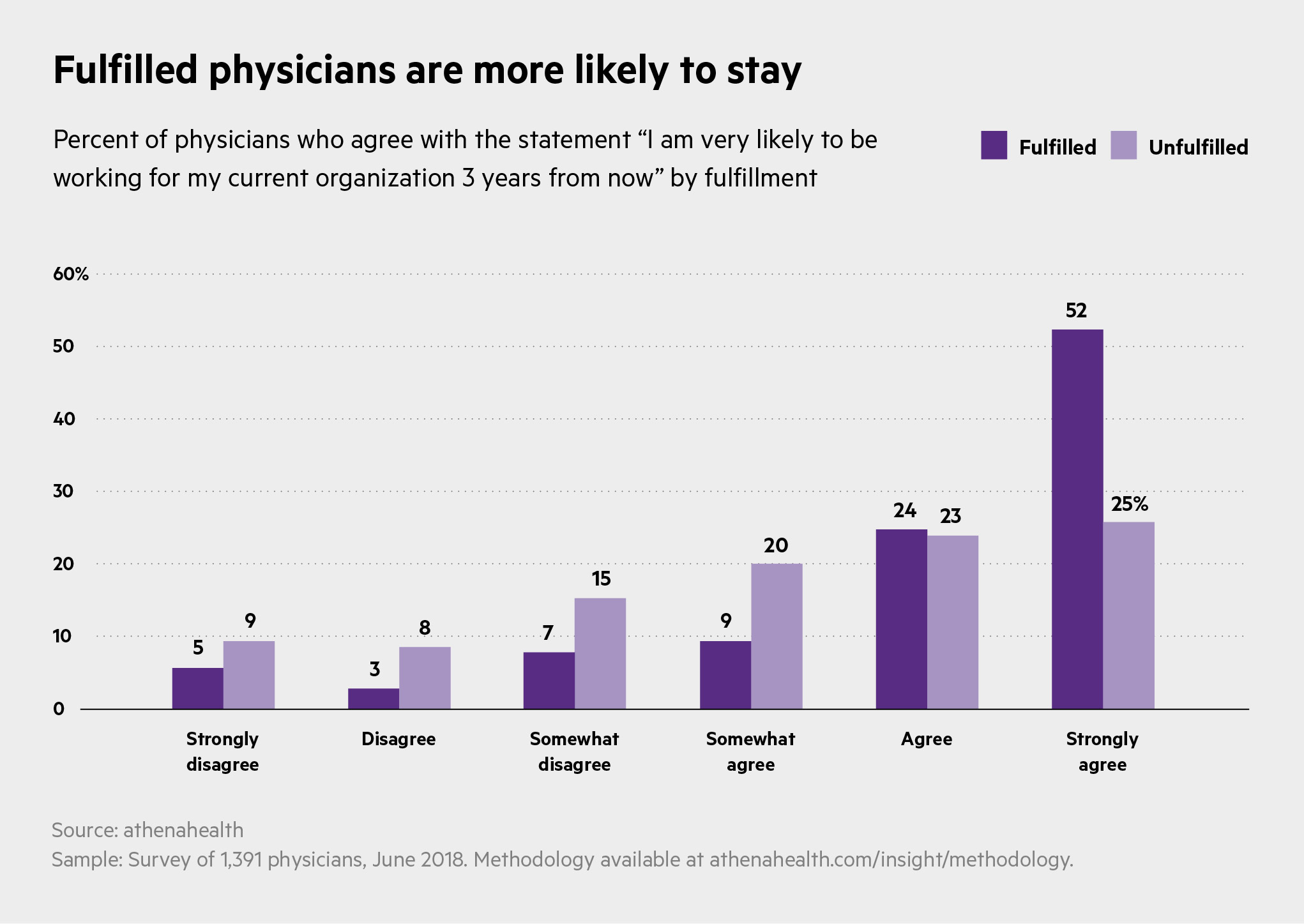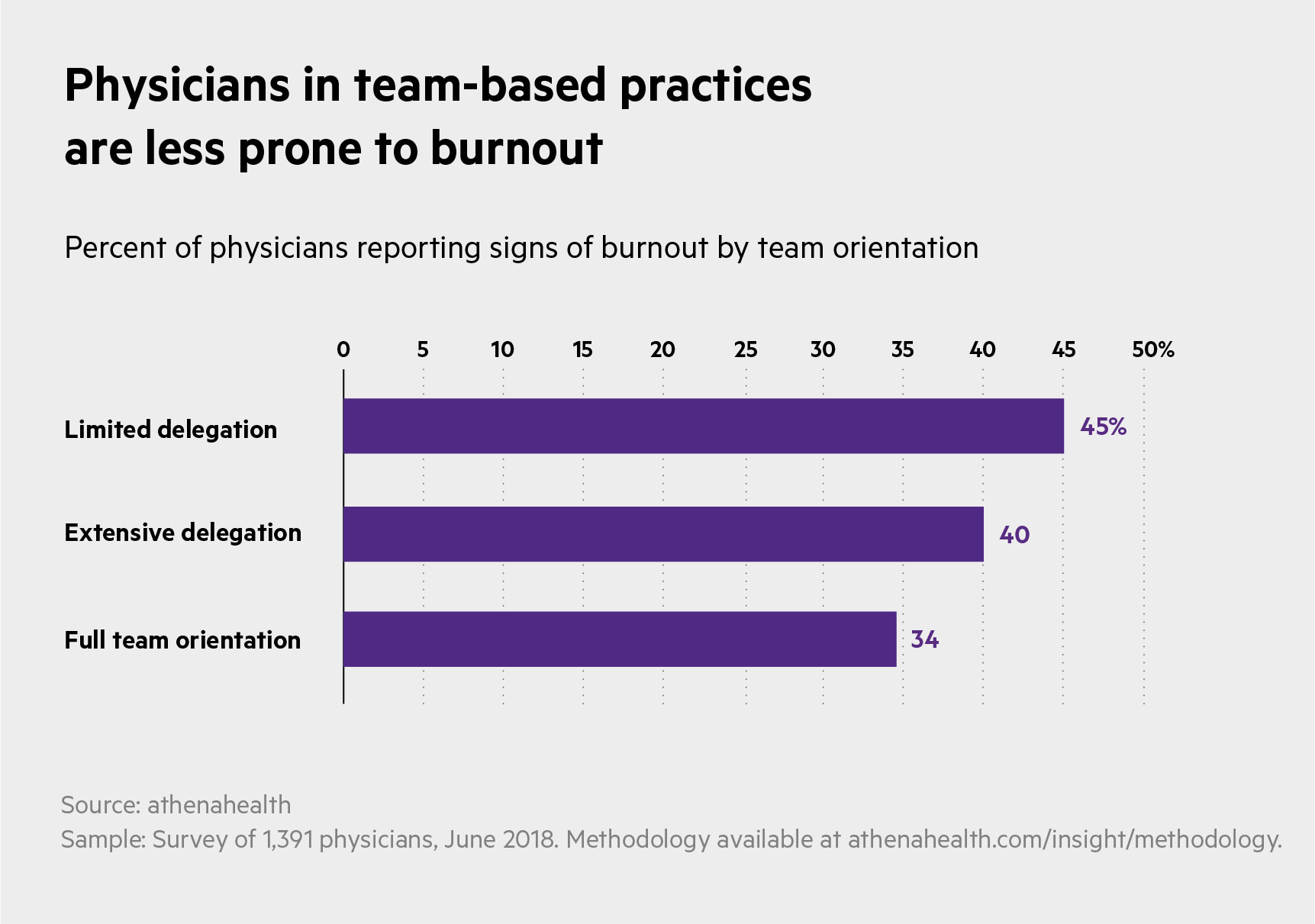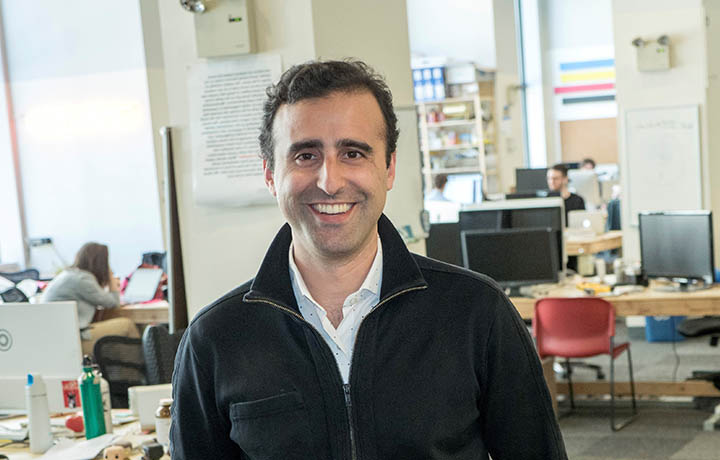Article
6 ways physicians find fulfillment in their work
By Lia Novotny | November 29, 2018

As the administrative and documentation burden increases for America's physicians, it is increasingly important that organizations find ways to help physicians continue to find meaning and fulfillment in their work.

According to new data from athenahealth, 78 percent of 1,391 physicians surveyed in June of 2018 reported experiencing a deep sense of fulfillment in their work at least once a week. And fulfillment appears to correlate with loyalty: 85 percent of fulfilled physicians agreed that they were likely to stay with their organizations for the next three years.
By comparison, only 68 percent of physicians who had low fulfillment scores agreed they were likely to stay.
Even more striking, a lack of fulfillment appears to have a stronger impact on intent to leave than burnout, making it crucial for healthcare organizations to pay attention to the way their structure, workflows, and culture create (or hinder) opportunities for professional fulfillment.
How to accomplish that goal? Medical group leaders interviewed as part of the research identified the following ways physicians find professional fulfillment.
1. Connecting with patients, especially over the long-term
It should come as no surprise that one of the most fundamentally fulfilling activities for physicians is building personal relationships with patients. They derive joy from getting to know their patients, their needs, and their personal lives, over time.
Edward Fasolino, M.D., a family medicine physician at Baylor, Scott & White Health in Belton, Texas, runs into patients all the time at the Walmart or gas station, and they ask him questions or for prescription refills. “I really enjoy that part of the job, knowing people, seeing patients when I'm out in town. And I have patients that I've been seeing since the first year I got here that are still with me. That's really special."
Physicians believe this continuity of care makes them better at their jobs. Anthony Gutierrez, M.D. at the Samuel U. Rodgers Health Center, a federally qualified health center in Kansas City, says, “I've been here four years, and I've seen some people 12, 14, 20 times already. Now it takes me half the time to see them … sometimes I can just walk in the room and know what's going on."
2. Seeing the impact they have on patients' lives
Physicians report they find tremendous meaning in their work when they can see the positive effect it has on their patients' day-to-day health and well-being, especially with the most complex cases, like those patients Gutierrez has seen some 20 times in four years. “I've seen patients lose 30 to 40 pounds, have their diabetes perfectly controlled, and go off their medication. I definitely see that I'm making a difference."
And this phenomenon isn't limited to primary care or family medicine – specialists, too, find meaning in the contribution they make to a patient's treatment or recovery. “When I get called [in on a case], I feel like I've contributed something to the patient's care," says Clayton Foster, M.D. at Colorado Infectious Disease Associates in Denver. “Maybe I help get them out of the hospital faster or hone in on the problem if it was a mystery case, or even just give them some reassurance."
3. Addressing social and behavioral determinants of health
As the shift to value-based care models pushes healthcare organizations to look beyond their walls at the upstream drivers of health, an unexpected consequence is the potential for greater satisfaction for physicians.
In the past, many were loath to even ask their patients about housing, food insecurity, or mental health needs because they had little power to help patients change those variables. But, with integrated behavioral health and increasing connections to networks of social support resources, physicians are relieved to be able to provide their patients with tangible assistance that goes beyond the exam room.
At Samuel U. Rodgers, Gutierrez is supported by a social worker, diabetic nurse, and care coordinator who are always available to help patients with their medical and non-medical needs – anything Gutierrez can't address in the exam room.
At Evergreen Family Medicine PC, a social/behavioral support team of chronic care managers, discharge planners, and integrated behavioral health specialists helps Heidi Beery, M.D., support her panel of highly complex patients. Beery, who sees 18 to 20 patients a day, says it takes a huge load off her mind knowing her patients are supported between visits and seen by the team at least once a month, even if she is booked.
4. Developing rapport with clinical colleagues
Again and again, physicians report that a strong clinical team serves patients better and acts as an antidote to burnout. It turns out the rapport they develop with teammates is also a source of fulfillment for many physicians.
High levels of collaboration and trust with colleagues can be a much-needed stress-reliever for physicians and lead to a greater sense of purpose in their work. Physicians build these these connections in many ways, sometimes with their own team, sometimes with colleagues on other teams, and even across specialties.
Abeezar Shipchandler, M.D. of Baylor, Scott & White Health's Plano, Texas, office, experiences this kind of camaraderie every day. “We are all in one office, so collaboration is easy, you are always talking to each other, seeing each other's patients, bouncing ideas off of each other – the entire culture encourages a collaborative effort."
Physicians who have close relationships with their colleagues are five times more likely to be engaged in their work than those who do not, according to athenahealth data, and 70 percent of physicians working in team-oriented practices report feeling deeply fulfilled in their work. What's more, physicians in team-based practices are less prone to burnout.

5. Tackling challenging cases
As a group, physicians are drawn to intellectual challenges, and they indicate this is a source of intellectual stimulation and excitement – especially when they find the answer.
“I went into infectious disease because I like tackling complex, challenging cases and having the chance to play detective," says Foster. “I like combing through interviews with patients and families, outside records, labs, and treatment to date, and putting it all together into a coherent story to come up with a diagnosis."
This is also true in primary care, where high-deductible health plans or a lack of insurance mean more and more patients rely on their PCPs rather than high-priced specialists. Gutierrez says, “It is more challenging, and more fun, but it's also a necessity, because otherwise [these patients] wouldn't get that care. I'm the endocrinologist they can't afford."
6. Maintaining schedule autonomy and flexibility
Handling complex cases and providing more depth of care may mean spending more time with patients.
Physicians consistently indicate that local control over their schedules and built-in flexibility helps them provide better care and, consequently, feel more fulfilled. This doesn't mean jeopardizing clinic flow, but it does mean letting the physician balance cases that are more time-consuming with those that are not.
Data from athenahealth back this up: Physicians who feel rushed once a week or less are nearly 40 percent more likely to report feeling a deep sense of fulfillment in their work every day, compared to their colleagues who more often feel rushed.
Brian Titesworth, M.D., of Clarkston Medical Group in Michigan, says his staff know which patients can be seen quickly and which need extra time, and they build that knowledge into his schedule. "If I have a 78-year-old who has multiple medical problems and needs to have his annual wellness visit, they're going to give me more time," Titesworth says.
He knows he could make more money if he saw patients more quickly, but says, “if I'm spending more time with patients, I feel more fulfilled," a trade-off he is glad he can determine for himself.
Putting it all together
The overall physician experience is nuanced and complex, with positive and negative experiences often coexisting. Research from athenahealth shows half of physicians who report symptoms of burnout still regularly experience a deep sense of fulfillment in their work.
Likewise, fulfillment is not the only factor in physician satisfaction and retention. But data suggest that it is an important one.
Often healthcare organizations seeking to retain and support their physicians focus on burnout – on reducing the negatives that can be associated with practicing medicine today. Examining the role fulfillment plays reminds us how important it can be to increase positive experiences, not just reduce negative ones.
Lia Novotny is a contributing writer to athenaInsight. Additional reporting by Payal Patnaik.







